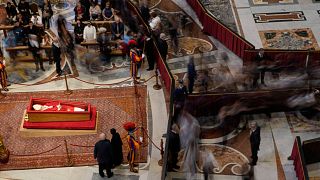Cameroon
"I have no one. I gave birth to fifteen children. Among these fifteen children..." Marie Ebop Ndjock, 77, does not finish her sentence. She collapses on the nearby table and bursts into tears, her head hidden between her arms.
"It's okay, Marie, don't cry anymore," a young caregiver from "La Référence", one of the few care centers for the elderly in Cameroon, located in the northern suburbs of Douala, the economic capital of this Central African country of some 25 million inhabitants, tries to comfort her.
Marie lifts her head, her eyes welling with tears. "The children tell me I am a witch, that I am this, that I am that..." she bellows, her voice trembling. "It hurts me.
Marie's crises are frequent. The staff of the association Love for the Elderly of Cameroon (APAC), which runs the place since its creation in 2017, is used to it.
"Fifteen children," she repeats over and over. And none to take care of her, because of a family dispute over the division of her property, in a country where family solidarity is a duty and a moral obligation.
"Westernization of Africa"
"In Cameroon, having an elderly person in your home is considered an opportunity. Knowledge is transmitted orally, from one generation to another, as experience increases with age," explains Moïse Tamekem Ngoutsop, a sociologist at the University of Bamenda.
"The retirement home is an incongruity in African culture," he says, and their creation is the result, according to him, of a "process of Westernization of Africa.
The eight inhabitants of the house arrive in dribs and drabs in the dining room for lunch. They move with difficulty, some in wheelchairs, some in walkers.
On the menu for lunch: Ndole with cassava, the national dish of Cameroon. Caregivers sit next to some of the patients and patiently help them bring the fork to their mouths.
At the origin of "The Reference", there is a vocation. "I started providing this service when I was 24 years old while working in hospitals where elderly people were often abandoned or mistreated," recalls Florence Ndjassep, founder and director of the space. "It was patients' relatives who asked me to take care of theirs at home, and then I realized that the need was real."
"Some were forced to spend the day locked up, having to wait all day for a family member to care for them to eat, be bathed or cared for. That's where the idea came from to create a center for the abandoned elderly," she explains.
In 2017, benefactors helped the project emerge. Today, donations account for 60% of the funding sources. The rest comes from patients' families. The religious community also helps the association with material donations.
The care is free for those who have no one to support them. For the others, it costs 75,000 FCFA per month (about 115 euros).
Strict containment
Then came the Covid-19 epidemic. Cameroon, with more than 80,000 reported cases and 1,310 deaths, is one of the most affected countries in Central Africa. "It hasn't been easy," admits Ms. Ndjassep. "Before, we sometimes took them to restaurants, or they could attend soccer games on the high school field next to the house. Now, the rule has been strict confinement," she continues.
"No cases of Covid have been detected," the director is now pleased to say, and she is once again willing to open the doors of the reception center. A relief for the occupants.
Ms. Ndjassep estimates that the center needs 600,000 FCFA (915 euros) per month to operate. The demand is increasing, she says, in a country where life expectancy has risen from 50 years in 2000 to 60 years in 2020, according to the World Bank.
She says she receives at least five applications a month but rarely responds.
AFP











00:49
Teachers strike shuts down schools across Cameroon
Go to video
The Okwelians: Unlocking New Economic Paths for Cameroon [Business Africa]
Go to video
South Africa prop Steven Kitshoff retires from all rugby
02:04
Cameroon sugarcane strike turns violent over wages
11:03
Five years later, is the AfCFTA already failing? {Business Africa}
02:19
Cameroonían jazz group wow audiences at Tunis music festival